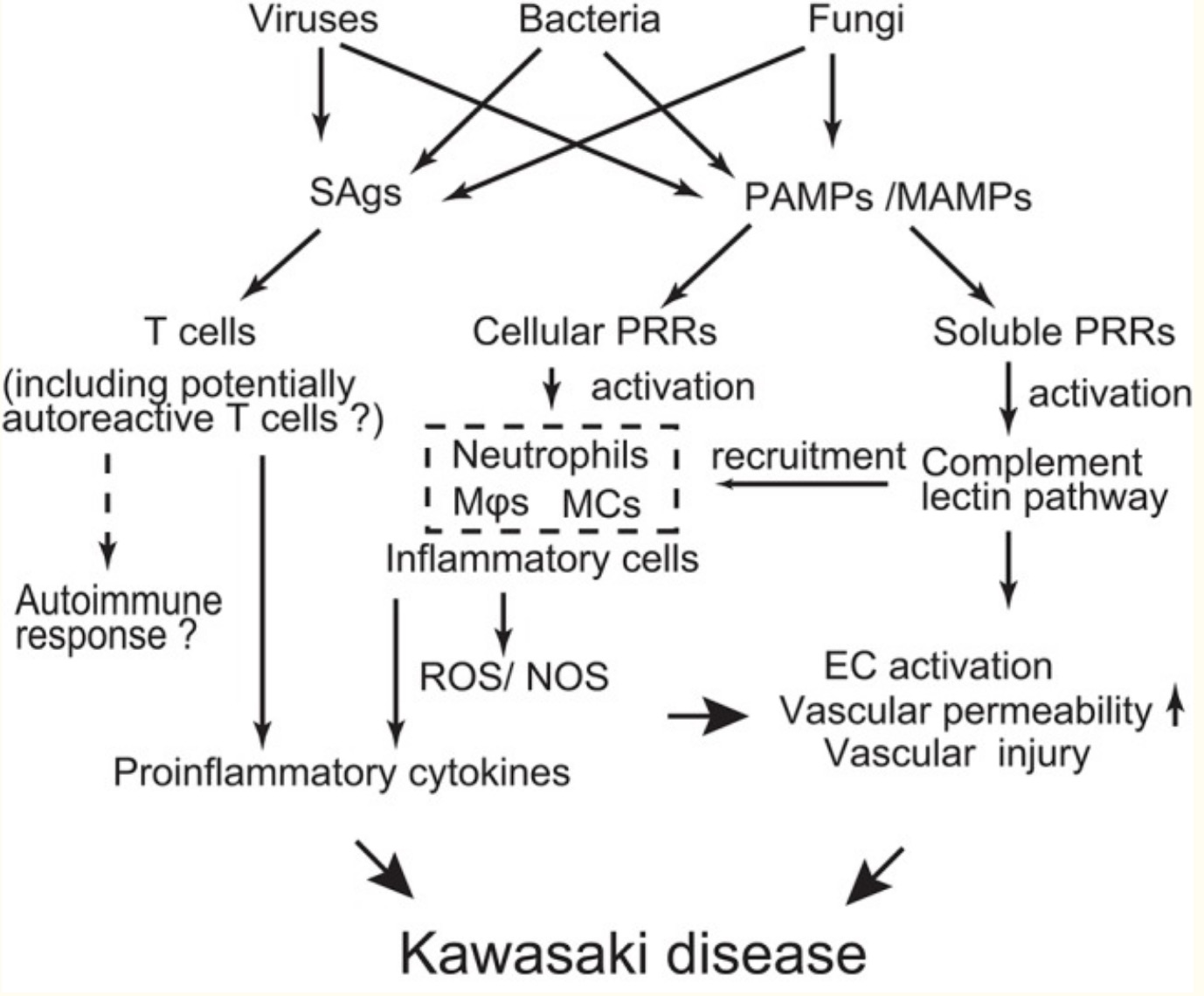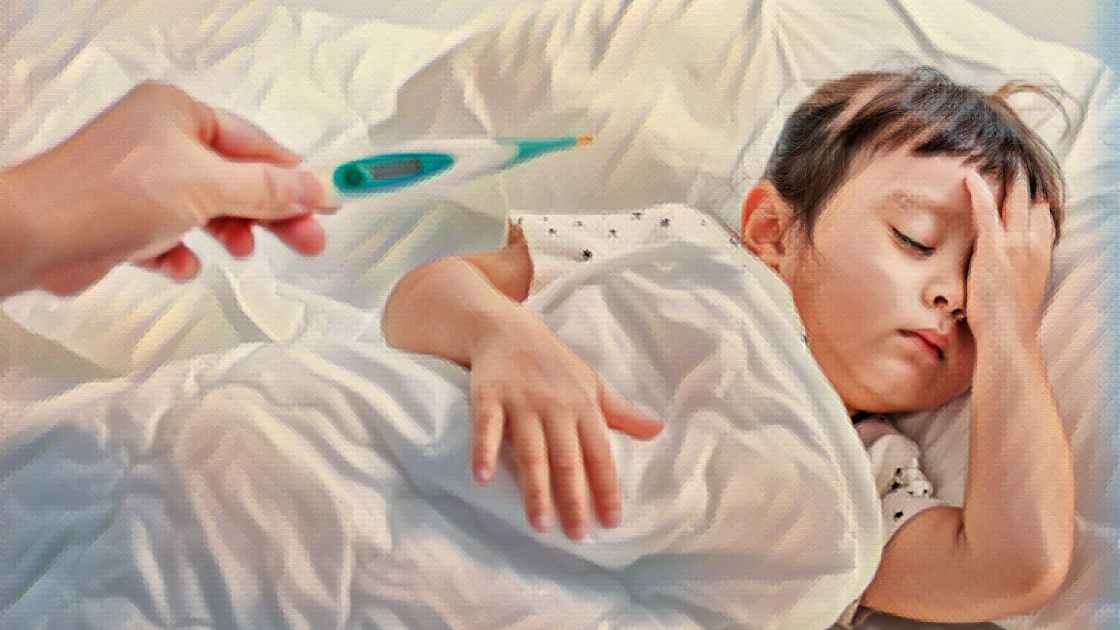Kawasaki disease is in the news these days in reference to kids with COVID-19 infections. It is an inflammatory condition that can occur in kids when they have been sick with a viral or bacterial illness.
This article explains what Kawasaki disease is and the (rare!) cases with COVID-19. It dives into the genetic variants that increase susceptibility.
What is Kawasaki Disease?
Kawasaki disease is a condition that causes inflammation in the endothelial cells that make up the medium-sized blood vessel and the muscle of the heart. It generally strikes infants and young children ages 5 and under.
Kawasaki disease details:
Symptoms can include:[ref][ref]
- rash, especially mouth and eyes
- fever, lasting for 5+ days
- red eyes
- red palms and swollen feet
- swollen, red tongue
- enlarge lymph nodes in the neck
- irritability
For most kids, the acute disease phase lasts less than 2 weeks, and it usually clears up on its own. The problem comes for the 25% of patients that end up with a longer-lasting disease, which can develop into long-lasting problems with their heart and blood vessels.[ref]
What causes Kawasaki Disease?
Researchers have debated the causes of Kawasaki disease for decades. Some researchers once theorized that it was triggered by an antigen (produced after an infection) that causes an autoimmune type reaction against the cells in the blood vessel walls. The problem with calling it an autoimmune type of reaction is this disease only lasts for a short period of time, unlike long-lasting autoimmune diseases. Most researchers believe it is caused by the activation of the immune system by a virus in the coronary arteries.[ref][ref]
Kawasaki disease is fairly common in Asian countries such as Korea, Japan, and China. It is diagnosed much less frequently in Western countries.[ref]
Inflammatory cytokines are elevated in children with Kawasaki disease. It is thought that a pathogen (virus, bacteria, fungi) causes an inflammatory and immune response that leads to the destruction of the epithelial cells in medium-sized blood vessels.[ref]
In a study from 2014, researchers found that cases of Kawasaki disease were caused by several different viruses, including “enterovirus (16.8% vs. 4.4%, p < 0.001), adenovirus (8.0% vs. 1.8%, p = 0.007), human rhinovirus (26.5% vs. 9.7%, p < 0.001), and coronavirus (7.1% vs. 0.9%, p = 0.003″.[ref]
There are also a number of bacterial pathogens, including staphylococcus aureus and streptococcus pyrogenes, that are suspected of causing Kawasaki disease. The figure below (Creative Commons license) outlines the mechanisms of how Kawasaki disease happens.[ref]

Are there links between Kawasaki Disease and COVID-19?
There have been many news reports (April and May 2020) of kids getting Kawasaki disease-like symptoms after getting the SARS-CoV2 virus. And from the number of news stories on the topic, parents may be worried.
A recent preprint of a study explained that only about 100 cases of Kawasaki disease in children (ages 6mo to 9 years) have been reported during this pandemic. Most of the cases in the study were in Europe. Cases seem to occur about 2 to 4 weeks after infection. The researchers note that Kawasaki disease is a rare complication of COVID-19 and estimate that it occurs in 0.01 – 0.3% of infected kids.[ref]
When you consider the very low number of cases of COVID-19 in children, it is not something that most parents need to be concerned about. Instead, realize that this is something that occurs more commonly with other childhood illnesses.
Kawasaki Disease Genotype Report:
Members: Log in to see your data below.
Not a member? Join here.
Why is this section is now only for members? Here’s why…
Related Articles and Topics:
COVID-19 & Genetics: Who gets sick and why?
Genetic variants play a role in susceptibility to infectious diseases. Not everyone will get the norovirus or a particular strain of the flu — due to genetic variants. New research shows that genetics also plays a role in the severity of COVID-19.
Blood Type and Coronavirus Susceptibility
Researchers are finding that blood type may play a role in the susceptibility to coronavirus. While this may seem strange at first, blood type actually influences the susceptibility and severity of several different pathogenic diseases.
Acute Respiratory Distress Syndrome (ARDS) genes
ARDS is caused by an overwhelming immune response to a virus, bacteria, or lung injury. Learn more about which of your immune system genes are involved in ARDS.
Viruses: Are you susceptible to coronavirus, flu, and more?
Your genetic variants shape your immune system and give you superpowers against some pathogens – and perhaps more susceptible to others.
References:
Ayusawa, Mamoru, et al. “Revision of Diagnostic Guidelines for Kawasaki Disease (the 5th Revised Edition).” Pediatrics International: Official Journal of the Japan Pediatric Society, vol. 47, no. 2, Apr. 2005, pp. 232–34. PubMed, https://doi.org/10.1111/j.1442-200x.2005.02033.x.
Chang, Luan-Yin, et al. “Viral Infections Associated with Kawasaki Disease.” Journal of the Formosan Medical Association, vol. 113, no. 3, Mar. 2014, pp. 148–54. PubMed Central, https://doi.org/10.1016/j.jfma.2013.12.008.
Huang, Ying-Hsien, et al. “Interferon-Gamma Genetic Polymorphism and Expression in Kawasaki Disease.” Medicine, vol. 95, no. 17, Apr. 2016, p. e3501. PubMed Central, https://doi.org/10.1097/MD.0000000000003501.
Kawasaki Syndrome | CDC. 4 June 2020, https://www.cdc.gov/kawasaki/index.html.
Khor, Chiea Chuen, et al. “Genome-Wide Association Study Identifies FCGR2A as a Susceptibility Locus for Kawasaki Disease.” Nature Genetics, vol. 43, no. 12, Nov. 2011, pp. 1241–46. PubMed, https://doi.org/10.1038/ng.981.
Kil, Hong-Ryang, et al. “Changes in Clinical and Laboratory Features of Kawasaki Disease Noted over Time in Daejeon, Korea.” Pediatric Rheumatology Online Journal, vol. 15, Aug. 2017, p. 60. PubMed Central, https://doi.org/10.1186/s12969-017-0192-y.
Lee, Yi-Ching, et al. “Two New Susceptibility Loci for Kawasaki Disease Identified through Genome-Wide Association Analysis.” Nature Genetics, vol. 44, no. 5, Mar. 2012, pp. 522–25. PubMed, https://doi.org/10.1038/ng.2227.
—. “Two New Susceptibility Loci for Kawasaki Disease Identified through Genome-Wide Association Analysis.” Nature Genetics, vol. 44, no. 5, Mar. 2012, pp. 522–25. PubMed, https://doi.org/10.1038/ng.2227.
Lou, Jiao, et al. “Systematic Confirmation Study of GWAS-Identified Genetic Variants for Kawasaki Disease in a Chinese Population.” Scientific Reports, vol. 5, Feb. 2015, p. 8194. PubMed, https://doi.org/10.1038/srep08194.
—. “Systematic Confirmation Study of GWAS-Identified Genetic Variants for Kawasaki Disease in a Chinese Population.” Scientific Reports, vol. 5, Feb. 2015, p. 8194. PubMed, https://doi.org/10.1038/srep08194.
—. “Systematic Confirmation Study of GWAS-Identified Genetic Variants for Kawasaki Disease in a Chinese Population.” Scientific Reports, vol. 5, Feb. 2015, p. 8194. PubMed, https://doi.org/10.1038/srep08194.
Marrani, Edoardo, et al. “How Should We Classify Kawasaki Disease?” Frontiers in Immunology, vol. 9, Dec. 2018, p. 2974. PubMed Central, https://doi.org/10.3389/fimmu.2018.02974.
—. “How Should We Classify Kawasaki Disease?” Frontiers in Immunology, vol. 9, Dec. 2018, p. 2974. PubMed Central, https://doi.org/10.3389/fimmu.2018.02974.
Morand, Aurélie, et al. COVID-19 and Kawasaki Like Disease: The Known-Known, the Unknown-Known and the Unknown-Unknown. May 2020. www.preprints.org, https://doi.org/10.20944/preprints202005.0160.v1.
Nakamura, Akihiro, et al. “Aetiological Significance of Infectious Stimuli in Kawasaki Disease.” Frontiers in Pediatrics, vol. 7, June 2019, p. 244. PubMed Central, https://doi.org/10.3389/fped.2019.00244.
Onouchi, Yoshihiro, et al. “A Genome-Wide Association Study Identifies Three New Risk Loci for Kawasaki Disease.” Nature Genetics, vol. 44, no. 5, Mar. 2012, pp. 517–21. PubMed, https://doi.org/10.1038/ng.2220.
Tang, Bin, et al. “Adjuvant Herbal Therapy for Targeting Susceptibility Genes to Kawasaki Disease: An Overview of Epidemiology, Pathogenesis, Diagnosis and Pharmacological Treatment of Kawasaki Disease.” Phytomedicine, vol. 70, Apr. 2020, p. 153208. PubMed Central, https://doi.org/10.1016/j.phymed.2020.153208.
—. “Adjuvant Herbal Therapy for Targeting Susceptibility Genes to Kawasaki Disease: An Overview of Epidemiology, Pathogenesis, Diagnosis and Pharmacological Treatment of Kawasaki Disease.” Phytomedicine, vol. 70, Apr. 2020, p. 153208. PubMed Central, https://doi.org/10.1016/j.phymed.2020.153208.
Debbie Moon is the founder of Genetic Lifehacks. Fascinated by the connections between genes, diet, and health, her goal is to help you understand how to apply genetics to your diet and lifestyle decisions. Debbie has a BS in engineering from Colorado School of Mines and an MSc in biological sciences from Clemson University. Debbie combines an engineering mindset with a biological systems approach to help you understand how genetic differences impact your optimal health.

